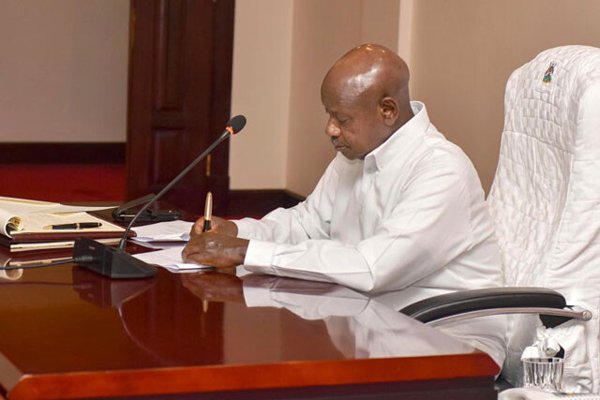President Yoweri Museveni has endorsed and signed three bills passed by parliament into law. These include; the Veterinary Practitioners Act 2023, the Animals Feeds Act 2023 and the National Records and Archives amendment bill 2024.
In a press release issued by the State House on May 14, 2024, the president assented to all three bills passed by parliament.
The Animals Feeds Act 2023, imposes a penalty of seven years for anyone found guilty of selling or producing adulterated animal feeds.
In the ACT, a person seeking to engage in the production, storage, and sale of animal feeds will apply for a license which shall be considered within three months. A similar arrangement is prescribed for anyone seeking a permit for premises to be used for storage, sale, and production of the feeds.
“The secretary to the committee shall, in collaboration with local governments, ensure that animal feeds are produced, stored or sold in safe and fit premises as prescribed in the second schedule,” reads the law
The new law guards against contamination of animal feeds by prohibiting the use of contaminants and providing safety measures for transportation of the feeds. It will be at the discretion of the minister to provide guidelines regarding transportation, following the removal of licensing transportation from the law.
The law requires the producer of animal feeds who owns a laboratory to retain the services of a chemist or animal nutritionist who shall be responsible for the analysis and testing of animal feeds and issue a certificate of analysis for each batch of animal feeds before it is released for sale.
The law seeks to promote the animal industry, as animal feeds account for 70 percent of the production costs and therefore, have a significant effect on production costs and profits.
The government justified passing the law by explaining why livestock in Uganda don’t grow well. This includes: Many animal diseases, not enough food for animals, especially low levels of legumes and protein, inadequate enough water in some areas, not enough places to store or process animal food, limited labs and not enough information or skills to make animal food.
Meanwhile, the Veterinary Practitioners Act 2023 grants all veterinary practitioners from the East African Community (EAC) region the opportunity to register for practice in Uganda. However, stringent requirements are imposed on practitioners from outside the bloc.
The move, which aims to facilitate regional integration and enhance cross-border services, has drawn mixed reactions from Uganda’s Parliament. The Agriculture Committee had initially opposed the proposal, arguing that the blanket recognition of EAC veterinary practitioners could disadvantage local professionals. The committee recommended prioritizing employment opportunities in veterinary practice for Ugandan nationals, citing concerns over the absence of a mutual recognition agreement among EAC member states.

It also repeals and replaces the Veterinary Surgeons’ Act, Cap. 277 that came into force in 1958 and has never been amended.
The law provides exemptions to categories of people who can offer minor veterinary services without a license. Such services may include, bloodless castration, bloodless dehorning, tailing of a lamb, earmarking of an animal and any other minor treatment intended to relieve pain in an animal.
Minister of State for Animal Husbandry, Dr Bright Rwamirama has defended the enactment of the Veterinary Practitioners Act, noting the critical role of veterinary services in enhancing livestock productivity. He emphasized the need to prioritize agricultural development and promote private sector initiatives within the animal industry.
Similarly, the National Records and Archives amendment bill 2024 was passed on Tuesday 27 February 2024.
The Act was enacted to provide for the rationalised management of all government and other public records and archives, for the preservation, utilization and disposal of such records and archives, and for other related matters






